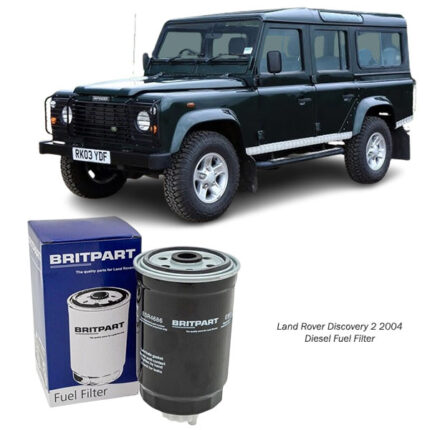-20%
Get Land Rover Defender TDI300 Fuel Filter ADZ92302 in Kenya
Fuel filters are often overlooked yet critical components of a vehicle’s fuel system. They play a vital role in ensuring that the engine receives clean and contaminant-free fuel, which is essential for optimal performance and longevity. In this discussion, we’ll explore the benefits of fuel filters and the signs that indicate when a car may need one.
Benefits of Fuel Filters:
- Contaminant Removal: One of the primary functions of a fuel filter is to trap contaminants such as dirt, rust, and debris present in the fuel. These contaminants can enter the fuel system during storage, transportation, or refueling. By capturing these particles, fuel filters prevent them from reaching the engine, where they can cause damage to fuel injectors, combustion chambers, and other components.
- Engine Protection: Clean fuel is essential for maintaining the health and performance of the engine. Fuel filters help protect sensitive engine parts from damage caused by abrasive particles or impurities in the fuel. By ensuring that only clean fuel reaches the engine, fuel filters contribute to reducing wear and extending the lifespan of critical engine components.
- Optimized Fuel Efficiency: A clean fuel supply is vital for achieving optimal fuel efficiency. When fuel injectors become clogged or obstructed by contaminants, they may not deliver the correct amount of fuel to the engine, resulting in inefficient combustion and decreased fuel economy. By keeping the fuel system clean, fuel filters help maintain proper fuel delivery and combustion efficiency, leading to improved mileage and reduced fuel consumption.
- Enhanced Engine Performance: Clean fuel is essential for achieving smooth engine operation and optimal performance. Fuel filters help prevent fuel-related issues such as misfires, hesitation, and rough idling by ensuring a consistent supply of clean fuel to the engine. By maintaining proper fuel flow and combustion, fuel filters contribute to smoother acceleration, responsive throttle response, and overall improved engine performance.
- Reduced Maintenance Costs: Regularly replacing the fuel filter is a relatively inexpensive maintenance task compared to repairing or replacing damaged fuel system components. By preventing contaminants from reaching the engine, fuel filters help reduce the risk of costly repairs and downtime associated with fuel system issues. Investing in a quality fuel filter and adhering to recommended replacement intervals can help save money on fuel-related maintenance over the life of the vehicle.
- Environmental Benefits: Properly functioning fuel filters not only protect the engine but also help reduce harmful emissions. Clean fuel combustion results in fewer pollutants being released into the environment, contributing to improved air quality and reduced environmental impact.
Signs a Car Needs a New Fuel Filter:
- Engine Stalling or Hesitation: If the engine stalls or hesitates during acceleration, it may indicate a clogged fuel filter. A restricted fuel flow can result in insufficient fuel reaching the engine, causing hesitation, sputtering, or even stalling, especially under heavy load or high-speed driving conditions.
- Difficulty Starting: A dirty or clogged fuel filter can impede the flow of fuel to the engine, making it difficult to start, especially when the engine is cold. If you experience prolonged cranking or difficulty starting your vehicle, it could be a sign of a fuel filter issue.
- Decreased Engine Performance: A decrease in engine performance, such as reduced power output, sluggish acceleration, or poor fuel economy, can be indicative of a clogged fuel filter. Insufficient fuel flow can lead to inefficient combustion and decreased engine power, resulting in diminished performance and fuel efficiency.
- Engine Misfires or Rough Idling: A clogged fuel filter can disrupt the fuel supply to the engine, leading to uneven combustion and engine misfires. You may notice symptoms such as rough idling, engine hesitation, or a noticeable loss of power during acceleration, indicating a potential fuel filter problem.
- Fuel Odor: A strong smell of gasoline inside or around the vehicle could indicate a fuel leak or a clogged fuel filter. If the fuel filter is not effectively trapping contaminants, it may allow fuel to leak or evaporate, resulting in a noticeable odor.
- Check Engine Light: The check engine light may illuminate on the dashboard if the engine’s computer detects a problem with the fuel system, including issues related to fuel flow or pressure. A clogged fuel filter can trigger a check engine light, signaling the need for inspection and potential replacement of the fuel filter
Follow us on Facebook for more parts.



